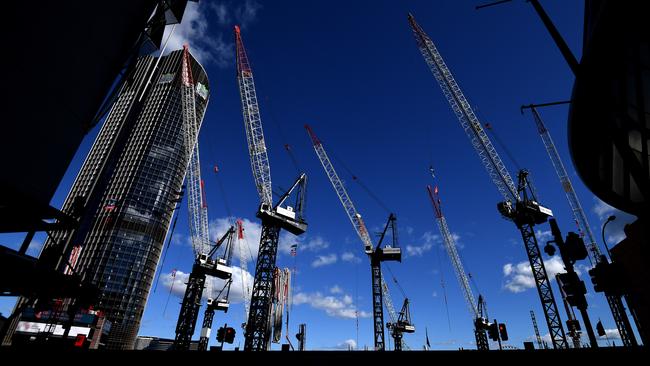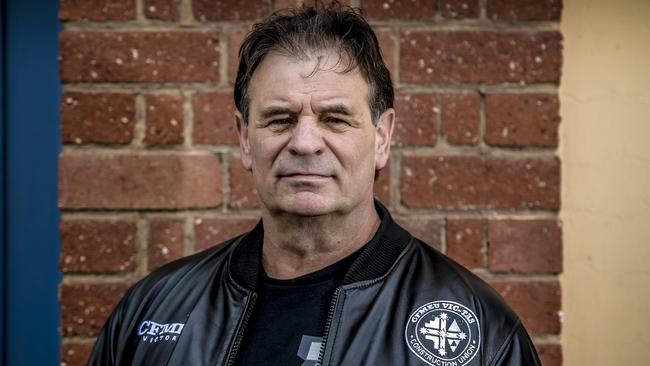Labourers on 36-hour week to earn $120,000 under proposed CFMEU pay deal
Labourers and stop sign holders will soon earn $120,000 a year under a CFMEU pay deal, with claims the union’s demands cost Victorian taxpayer’s an extra $74m on one recent road project.

Victoria
Don't miss out on the headlines from Victoria. Followed categories will be added to My News.
Labourers and junior stop-sign holders working 36-hour weeks on construction sites will soon earn $120,000 a year under a new union pay deal.
The militant CFMEU is set to sign a new workplace agreement that will see the union’s workers, including on the state’s Big Build, pocket “at least” a 5 per cent pay rise.
The deal would mean basic labourers and traffic controllers – who operate the stop-and-go paddle pop signs – would earn more than $2000 a week over the three-year agreement, and pocket another $260 a week in a travel allowance.
The $120,000-a-year figure is for a basic 36-hour week – those working overtime or more than five days a week would rake in much more.
The average full-time weekly income is $1838 a week.

The deal is on the verge of being inked despite concerns about high construction industry costs and allegations that the CFMEU drives up the bills of builders in Victoria.
Those concerns have seen the state opposition launch a fresh push for a parliamentary inquiry into state-funded infrastructure, based on site payment schedules it obtained for two taxpayer-funded road upgrades.
It says the Craigieburn Rd Upgrade, where the CFMEU is the main union, ran up a bill of $190m, while the Sunbury Rd project bill, where the AWU was on site, ran up $116m.
Opposition employment and industrial relations spokesman David Hodgett said: “Labor’s reliance on the hardline CFMEU has cost taxpayers an extra $74m at a time they can least afford it and Jacinta Allan must explain this discrepancy.”
Opposition spokesman for outer suburban growth Evan Mulholland said a parliamentary committee should be set up to examine the state’s infrastructure pipeline.
But Major Roads Project Victoria program director Dipal Sorathia said: “The Sunbury Rd Upgrade and Craigieburn Rd Upgrade project areas are vastly different working environments with different complexities.”
Union boss John Setka said workers were entitled to healthy wage hikes during a cost-of-living crisis.
“It could be more than 5 per cent (a year),” he said.
“Everyone is allowed to increase the cost of everything but we are not allowed to increase wages – fair dinkum? “We want a pay rise to keep up with the cost of living and we are not allowed? We are not going to be the sacrificial lambs.”
Wage costs would be passed through to Victorian infrastructure project prices, just as budget blowouts and spiralling state debt are hitting hard.

Major firms locked in the negotiations, along with industry representatives such as Master Builders Victoria, have pushed back against excessive ambit demands that were as high as 12 per cent a year during initial talks, but one source said they were wary of pushing back too hard due to the “industrial might” of the CFMEU.
“Things will cost more to build. Then it ends up costing taxpayers,” one insider said.
They pointed to site shutdowns imposed by the union last year in a dispute with a second-tier builder, ostensibly over OH&S issues, that caused chaos and financial pain.
Mr Setka said the union wasn’t ruling out industrial action if a deal was “derailed”, but claimed projects with the CFMEU involved were delivered on time and on budget.
Negotiations for the new deal have also looked to lock in job-share opportunities, where two people effectively work a half-day each.
There will also be a trial of a five-day week, which means no weekend construction shifts unless absolutely necessary, on some sites – despite a large number of CFMEU members saying weekend penalty rates were important to them.
The union’s presence on building sites is also set to be solidified, with the CFMEU keen to strip from its agreements the last of the Howard-era “prohibited content” terms, which were designed to temper union control at workplaces.
Mr Setka said when Kevin Rudd and Julia Gillard – who he described as “two morons” – were in charge they kept the Howard-era industry watchdog the Australian Building and Construction Commission, but that this time under Labor was “different”.
The Albanese government abolished the ABCC and has proposed a series of significant changes to industrial relations.



